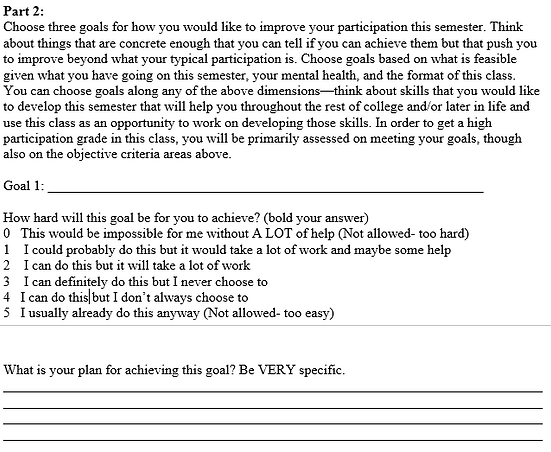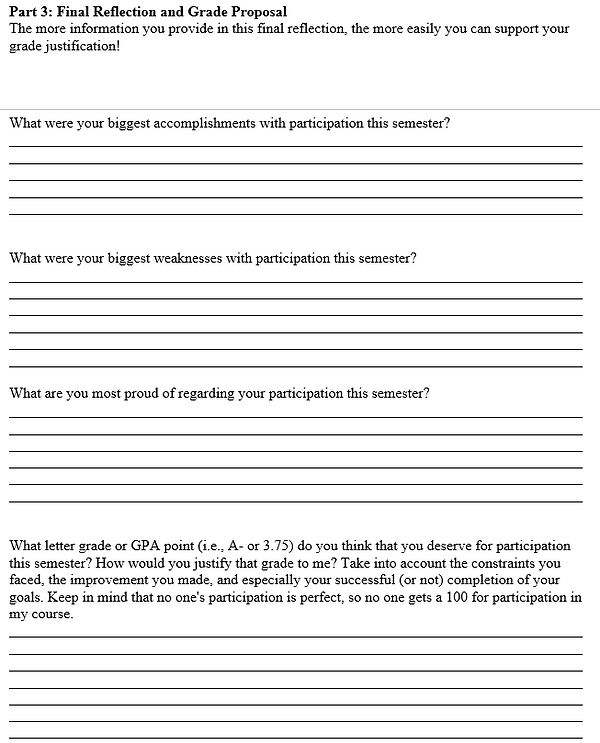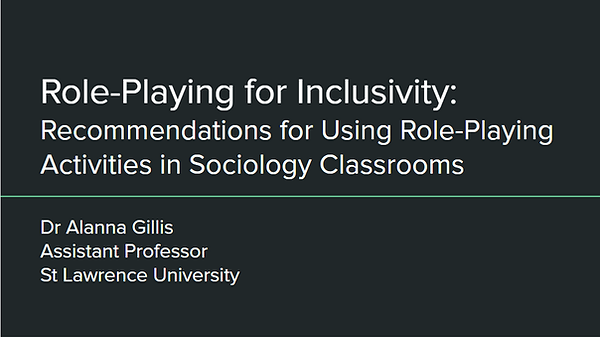Alanna Gillis, PhD
Sociology
Teaching
Introduction to My Teaching
My goal is to increase equity in the classroom through the implementation and innovation of student-centered pedagogy in my own classroom and to share resources to help others do the same. Below you will find a list of my awards, PDFs and links to my teaching publications and select teaching and learning presentations, and open-access versions of some of my course assessments and activities, as well as other resources related to my pedagogy research.
My courses include:
-
Introduction to Sociology
-
Introductory Sociology: Inequality
-
Sociology of Education / Education & Society
-
Sociology of Family with community based learning
-
Sociology of Careers
-
DEI in Higher Education seminar
Teaching Awards
2025 St Lawrence Excellence in Teaching Award
2022 Communications Across the Disciplines Fellow, SLU
2021 Scholarly Contributions to Teaching and Learning Award, ASA Section for Teaching and Learning
2020 Tanner Teaching Assistants Award for Excellence in Undergraduate Teaching, UNC-CH
2020 Wilson Teaching Award, Department of Sociology, UNC-CH
2019 Graduate Contributions to the Sociological Scholarship of Teaching and Learning Award, ASA Section for Teaching and Learning
2019 SAGE Publishing Keith Roberts Teaching Innovations Award (category: experienced)
Teaching Publications and Select Presentations (Open Access)
Gillis, Alanna. 2025. “Beyond Problems Toward Solutions: Lesson Plans, Unit Themes, and Assessment Ideas for Varied Sociology Courses.” American Sociological Association Annual Meeting. Chicago, IL. [Link to slides]
Gillis, Alanna. 2025. “Teaching Intersectionality Inclusively.” American Sociological Association’s Teaching and Learning Preconference: Charting a Path Amid Uncertainty: Teaching Sociology in Times of Austerity, Backlash, Technological Change, and Political Polarization. Chicago, IL. [link to slides]
Gillis, Alanna and Alexandria Szabo. 2025. “Why Hyflex Teaching Should Not Become the New Normal in Higher Education.” Teaching Sociology 53(2): 97-109. [Link and PDF]
Gillis, Alanna. 2023. “Teaching Sociology of Education: Recommendations for Mini-Units and Full Courses.” Pp. 231-243 in Handbook of Teaching and Learning in Sociology, edited by Sergio Carbrera and Stephen Sweet. DOI: 10.4337/9781800374386.00027.
Gillis, Alanna and Diane Pike. 2023. “Presenting SoTL Research on the Job Market and Across Your Career.” In The Teaching Sociological Playbook, edited by Stephanie Medley-Rath and Gregory Kordsmeier. SAGE. https://us.sagepub.com/en-us/nam/the-teaching-sociology-playbook
Gillis, Alanna. 2023. “HyFlex Should Not Become the Norm.” Inside Higher Ed, Opinion. https://www.insidehighered.com/views/2023/03/10/six-reasons-why-hyflex-shouldnt-become-norm-opinion
Gillis, Alanna. 2022. “An Evidence-Based Way to Improve Students’ Participation and How to Grade It.” Cultivating Purpose: Insights and Ideas from St Lawrence University’s Center for Innovation in Teaching and Assessment. https://sites.stlawu.edu/cita/2022/12/31/guest-post-alanna-gillis-an-evidence-based-way-to-improve-students-participation-and-how-to-grade-it/
Gillis, Alanna. 2022. "Role-Playing for Inclusivity: Recommendations for Using Role-Playing Activities in Sociology Classrooms." Presentation at Southern Sociological Society, Birmingham, AL. [Link to slides]
Gillis, Alanna. 2022. "Sociology of Education Syllabus." Syllabus published in TRAILS: Teaching Resources and
Innovations Library for Sociology. Washington DC: American Sociological Association. [Link, Syllabus PDF, and usage notes document]
Gillis, Alanna, and Elena Alvarado-Strasser. 2021. "Grading and Inequality" Workshop Session. ASA Teaching and Learning Preconference: Rising to the Duboisian Challenge in the Classroom. Chicago, IL (online). [Link to slides]
Gillis, Alanna, and Laura M. Krull (equal authorship). 2020. “COVID-19 Remote Learning Transition in Spring 2020: Class Structures, Student Perceptions, and Inequality in College Courses.” Teaching Sociology: 48(4): 283-299. [Link and PDF]
Gillis, Alanna. 2019. “Reconceptualizing Participation Grading as Skill Building.” Teaching Sociology 47(1): 10-21. [Link and PDF]
Gillis, Alanna, and Brionca Taylor*. 2019. “Social Networks and Labor Market Inequality: A Role-Playing Activity to Teach Difficult Concepts.” Teaching Sociology 47(2): 148-156. [Link and PDF]
Gillis, Alanna. 2018. “School Choice and Inequality: Choosing Schools Activity.” Class Activity published in TRAILS: Teaching Resources and Innovations Library for Sociology. Washington DC: American Sociological Association [Link and PDF]
*8th most downloaded resource in TRAILS in 2018
Gillis, Alanna. 2018. “Class School Board Debate Activity: Should Tracking Be Reformed?” Class Activity published in TRAILS: Teaching Resources and Innovations Library for Sociology. Washington DC: American Sociological
Open-Access Teaching Resources
The resources below are available to be used without restriction in order to help anyone who would like improve their teaching or consider new perspectives on teaching and learning. My only request is that if you use any of these resources beyond your own classrooms that you cite and give appropriate credit. Please share and edit as widely as you would like.
Participation Self-Assessment Resources:
Below you will find the links to the google forms I use to implement my participation self-assessment system described in my Reconceptualizing Participation Grading article (link and PDF above). The links include the initial participation goals, the midterm check in, and the final participation reflection. I recommend that you adjust the participation categories and descriptions as relevant to your own course and goals.
Links to sample versions of my participation resources:
Role-Playing Activities:
I have published two TRAILS activities and one Teaching Sociology article about some of my role-playing activities. The TS article provides a great overview of what role-playing activities are and why they can be helpful in the classroom. Namely, they help students explore the interplay of structure and agency in different settings (in my example activities this includes role-playing as parents to choose a school for their child, role-playing as various community members in a fictitious school board debate, and role-playing as job seekers or employers). Additionally, by providing students an opportunity to have fun while learning, they are more likely to be receptive to learning the relevant concepts after the activity is complete and remember them for a longer time period.
Role-playing activities are also advantageous in that they allow course discussions about "personal" experiences of privilege and oppression but from the perspective of their character, rather than their real lives, making these kinds of activities more inclusive of students who have faced oppression because they will not be obligated to share their trauma with the class (unlike activities that center exclusively on student past experiences such as privilege walks).
All resources you need to examine and implement the TRAILS activities are available from the teaching publications section above, using either the link (if ASA member) or the PDF (if not a member). The social network activity is described in the TS (link and PDF above) but the actual handouts and resources needed to implement it are below. Note that you just adjust the activity based on class size. I have two formats of the activity below, one for a small class and one for a medium class. I recommend having a few extra roles that are non-essential to the activity to have available in case more students show up for class than is typical for your daily attendance.
Links to resources to complete the Social Networks Activity:
-
Role-specific instruction handout: 15 students or 42 students
-
Social network visualization: 15 students or 42 students
-
Overview of all roles for instructor: 15 students or 42 students
-
Powerpoint slides to use during class activity day: 15 students or 42 students
*Note: the 42 student course was my sociology of education course that completed this activity while reading the book Paying for the Party and so the slides explicitly draw on the book. For a more general version of the lesson plan, rely on the content in the 15 student course which was a summer section of my introduction to sociology course that had no prior reading or associated knowledge.



